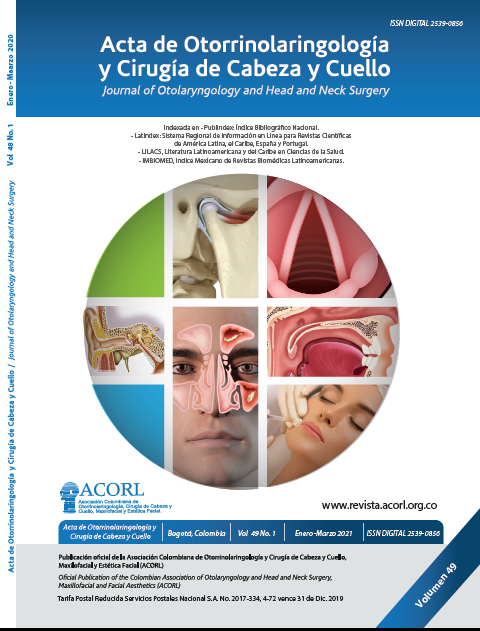Pedagogy and otorhinolaryngology, alterity in pandemic times
Main Article Content
Abstract
Medical education is currently going through a time of crisis where it requires an implementation of pedagogical strategies based on constructivist educational models and leaves aside part of the traditional educational model. Currently, further changes and adjustments to the educational model in the specialty of otolaryngology are required
for the training of first and second specialty resident physicians by the global pandemic state. Relying on information and communication technologies applied to medical education deserves more relevance in training programs, likewise an educational look where the otherness (We-Others) takes relevance with an active role among the groups of teachers and students without leaving aside the participation of the academic formation centers by means of a joint work, this is the new educational
horizon for medical-surgical postgraduate programs.
Downloads
Article Details

This work is licensed under a Creative Commons Attribution-ShareAlike 4.0 International License.
Este artículo es publicado por la Revista Acta de Otorrinolaringología & Cirugía de Cabeza y Cuello.
Este es un artículo de acceso abierto, distribuido bajo los términos de la LicenciaCreativeCommons Atribución-CompartirIgual 4.0 Internacional.( http://creativecommons.org/licenses/by-sa/4.0/), que permite el uso no comercial, distribución y reproducción en cualquier medio, siempre que la obra original sea debidamente citada.
eISSN: 2539-0856
ISSN: 0120-8411
References
Chick RC, Clifton GT, Peace KM, Propper BW, Hale DF, Alseidi AA, et al. Using Technology to Maintain the Education
of Residents During the COVID-19 Pandemic. J Surg Educ.2020;77(4):729-32. doi: 10.1016/j.jsurg.2020.03.018
Sabharwal S, Ficke JR, LaPorte DM. How We Do It: Modified Residency Programming and Adoption of Remote Didactic
Curriculum During the COVID-19 Pandemic. J Surg Educ. 2020;77(5):1033-36. doi: 10.1016/j.jsurg.2020.05.026
Okland TS, Pepper JP, Valdez TA. How do we teach surgical residents in the COVID-19 era? J Surg Educ. 2020;77(5):1005-
doi: 10.1016/j.jsurg.2020.05.030
Ortega P. Pedagogía y alteridad. Una Pedagogía del Nos-Otros.Revista Virtual Universidad Católica del Norte. 2012;35:129-46.
Díaz M. ¿Qué es eso que se llama pedagogía? Pedagogía ySaberes. 2019; 50:11-28.
Sahi PK, Mishra D, Singh T. Medical Education Amid theCOVID-19 Pandemic. Indian Pediatr. 2020;57(7):652-7. doi:
1007/s13312-020-1894-7
Kowalski LP, Sanabria A, Ridge JA, Ng WT, de Bree R,Rinaldo A et al. COVID-19 pandemic: Effects and evidencebased
recommendations for otolaryngology and head and neck surgery practice. Head Neck. 2020;42(6):1259-67. doi:
1002/hed.26164
Quesada PR, Solis RN, Diaz RC, Kraft SM. Otolaryngology Residency Application during the SARS-CoV-2 (COVID-19)
Pandemic. Otolaryngol Head Neck Surg. 2020;163(1):89-90.doi: 10.1177/0194599820925037
Comer BT, Gupta N, Mowry SE, Malekzadeh S. Otolaryngology Education in the Setting of COVID-19: Current and Future
Implications. Otolaryngol Head Neck Surg. 2020;163(1):70-4.doi: 10.1177/0194599820923621
Shuman AG. Navigating the Ethics of COVID-19 in Otolaryngology. Otolaryngol Head Neck Surg. 2020;162(6):811-
doi: 10.1177/0194599820920850
Histodidáctica [Internet]. Barcelona: Universitat de Barcelona;2012. [fecha de acceso: Diciembre 14 de 2020]. Peña JV.
Desarrollo profesional del docente universitario. Disponibleen: http://www.ub.edu/histodidactica/index.php?option=com_
content&view=article&id=60:desarrollo-profesionaldel-docente-universitario&catid=15:debate-y-sistemaeducativo&
Itemid=103
Rose S. Medical Student Education in the Time of COVID-19.JAMA. 2020;323(21):2131-32. doi: 10.1001/jama.2020.5227
Choi B, Jegatheeswaran L, Minocha A, Alhilani M, NakhoulM, Mutengesa E. The impact of the COVID-19 pandemic on
final year medical students in the United Kingdom: a national survey. BMC Med Educ. 2020;20(1):206. doi: 10.1186/s12909-
-02117-1
Imielski B. The detrimental effect of COVID-19 on subspecialty medical education. Surgery. 2020;168(2):218-9. doi: 10.1016/j.surg.2020.05.012
Dedeilia A, Sotiropoulos MG, Hanrahan JG, Janga D, Dedeilias P, Sideris M. Medical and Surgical Education Challenges and Innovations in the COVID-19 Era: A Systematic Review. In Vivo. 2020;34(3 Suppl):1603-11. doi: 10.21873/invivo.11950
Daodu O, Panda N, Lopushinsky S, Varghese TK Jr, Brindle M. COVID-19 - Considerations and Implications for Surgical
Learners. Ann Surg. 2020;272(1):22-23. doi: 10.1097/SLA.0000000000003927
Moszkowicz D, Duboc H, Dubertret C, Roux D, BretagnolF. Daily medical education for confined students during
coronavirus disease 2019 pandemic: A simple videoconference solution. Clin Anat. 2020;33(6):927-8. doi: 10.1002/ca.23601
Rozo R, Escobar R. La educación médica en Colombia. Revista Med. 2011;19 (1):7-9.
Ferrel MN, Ryan JJ. The Impact of COVID-19 on Medical Education. Cureus. 2020;12(3):e7492. doi: 10.7759/
cureus.7492
Sánchez J. Educación médica en tiempo de pandemia: el caso de la enfermedad por coronavirus 2019 (COVID-19). Educ
Med. 2020;21(4):259-60.
Vásquez R. Educación remota en médicos residentes en tiempos de COVID-19. Educ Med. 2020;21:282.

